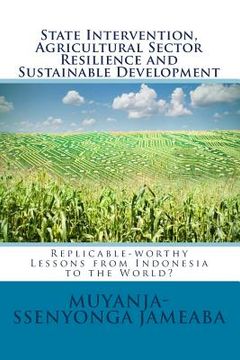State Intervention, Agricultural Sector Resilience and Sustainable Development: Replicable-worthy Lessons from Indonesia to the World? (en Inglés)
Reseña del libro "State Intervention, Agricultural Sector Resilience and Sustainable Development: Replicable-worthy Lessons from Indonesia to the World? (en Inglés)"
The book delves into some of the key issues that have influenced the growth and development of agriculture, which have included but not limited to state intervention that has encompassed putting in place legal framework that laid the foundation, principles, and practices on which operators in agricultural sector operate; direct involvement in the disbursement of directed credit programs to priority sectors; liberalization of trade and financial services while leaving key sub sectors of agriculture such as food crops off limits to any investment that is not allowed by the stated, which has impacted on the agricultural sector by making it relatively unattractive compared with other sector. The agricultural sector has been susceptible to policy change and shifts from highly supportive, import substitution strategy from 1960s to mid-late 1980s to partly liberalized and partly state controlled export-promotion strategy that has characterized the thrust of Indonesian government development policy since 1990s. State involvement has played a pivotal role in increasing the importance of agricultural sector in the economy as reflected in gains in productivity, farmer incomes, household and national food security, employment, poverty incidence, industrial sector performance and foreign exchange earnings. However, agricultural growth and development has come at high financial and ecological costs. Agricultural production has in part been responsible for deforestation, land and forest fires that continue to cause enormous health, financial, weather, and ecological problems and attendant costs to the local population as well as in neighboring countries; man-made disasters that include floods, floods and landslides, rising ferocity and frequency of destructive winds (trees that serve as breakers of high speed winds are cut to give way to farming. The shift from growing and consuming traditional food crops to rice, state intervention in agricultural development in Indonesia has unwittingly contributed to aggravating food insecurity at the household, regional level, and therefore. The partial removal of subsidies in place since 1998, led to high rice prices, and higher expenditure for all Indonesians, rich and poor. Consequently, underemployment and open employment rates remain high, as is income disparity across income groups and regions. Nonetheless, state intervention in agriculture can help to eliminate lingering poverty incidence in suburban areas, most rural areas on Java and Outer Java areas, and Eastern Indonesia in general. Going forward, effectiveness of agricultural policy will hinge on the degree to which it promotes direct investment in improving and enhancing human resource capacity of farmers and rural population as this important resource still constitutes a major drag on any efforts toward not only improving and increasing agricultural productivity and production but also orienting the agricultural sector from inefficient and ineffective resource use to sustainable frugality. This sets the stage for Indonesian policy makers, citizenry, civil society, and other stakeholders to take the necessary steps to nudge back the country's development path from growth at any cost to one that that is both economically, ecologically, and 'social-culturally' sustainable. It is a challenge that while daunting is not only imperative but also very important for the country to take as it joins other United Nations members in charting a new development course of sustainable development in 2015.

